Your DevOps Engineer resume is your chance to show how you bridge the gap between development and operations, making software delivery faster and more reliable. By clearly sharing your achievements and the tools you’ve mastered, you can catch the eye of hiring managers looking for someone who can keep systems running smoothly and improve deployment processes. Understanding what a hiring manager is looking for in a DevOps engineer resume is crucial to tailoring your application and increasing your chances of landing the job.
In this guide, you’ll find practical DevOps Engineer resume examples with expert resume writing tips. This article provides both a DevOps Engineer resume example and multiple DevOps Engineer resume examples to help you craft your own resume. Whether you’re just starting your career or stepping into a senior role, these insights will help you craft a resume that highlights your technical skills and problem-solving abilities, making you stand out in this fast-growing industry.
DevOps Engineer Resume Examples
To help you create a standout DevOps engineer resume, here are carefully crafted examples that demonstrate how to effectively showcase your technical expertise, achievements, and collaboration with development and operations teams.
DevOps Engineer Resume
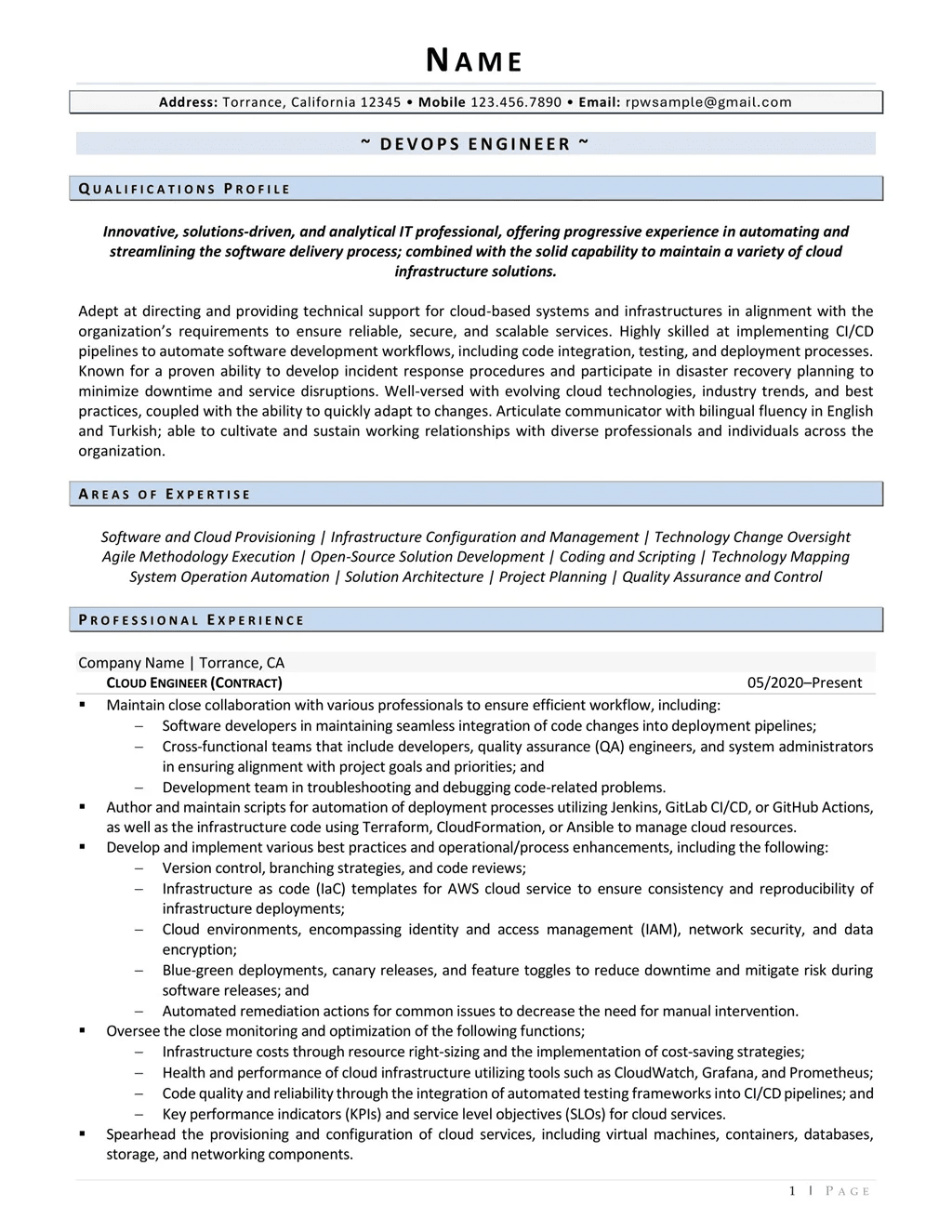
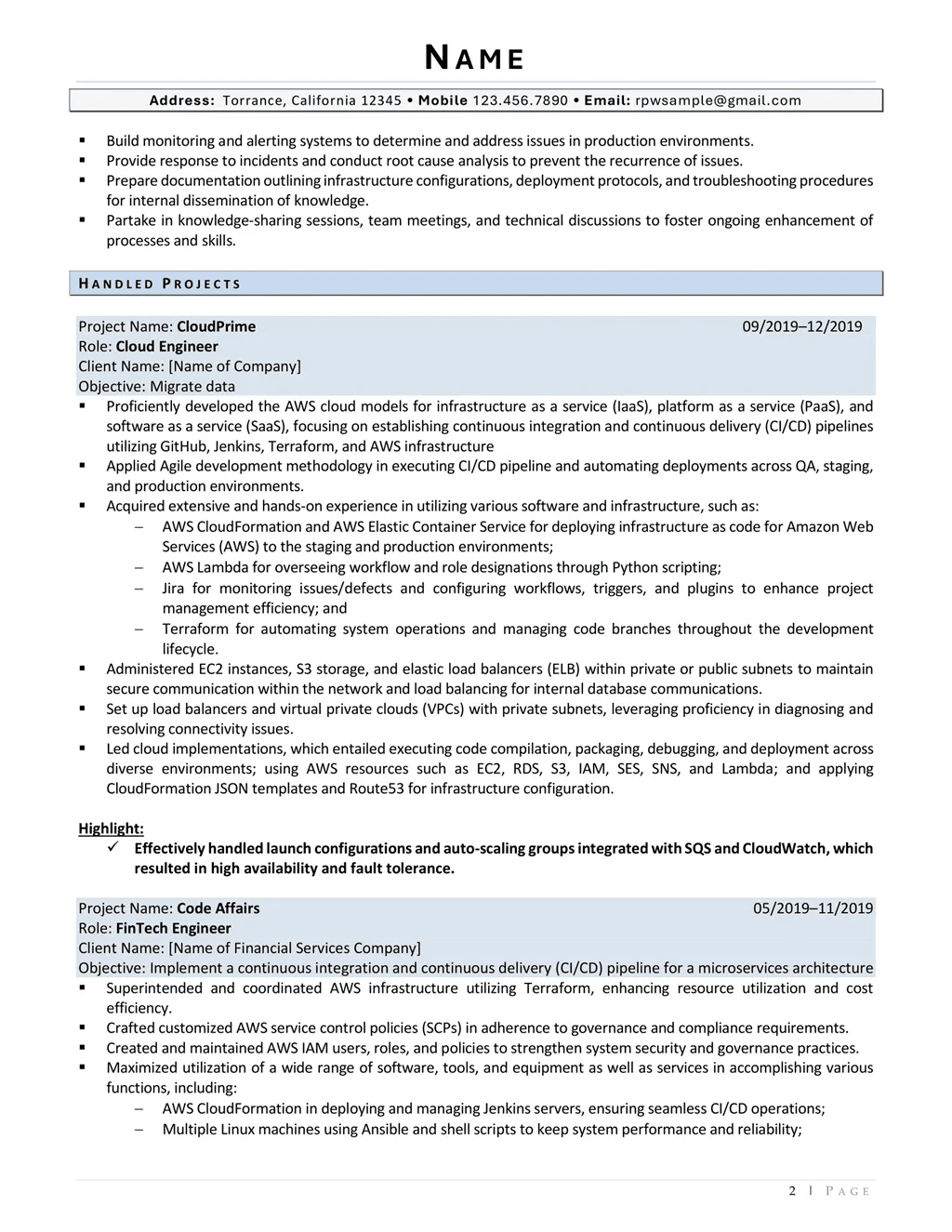
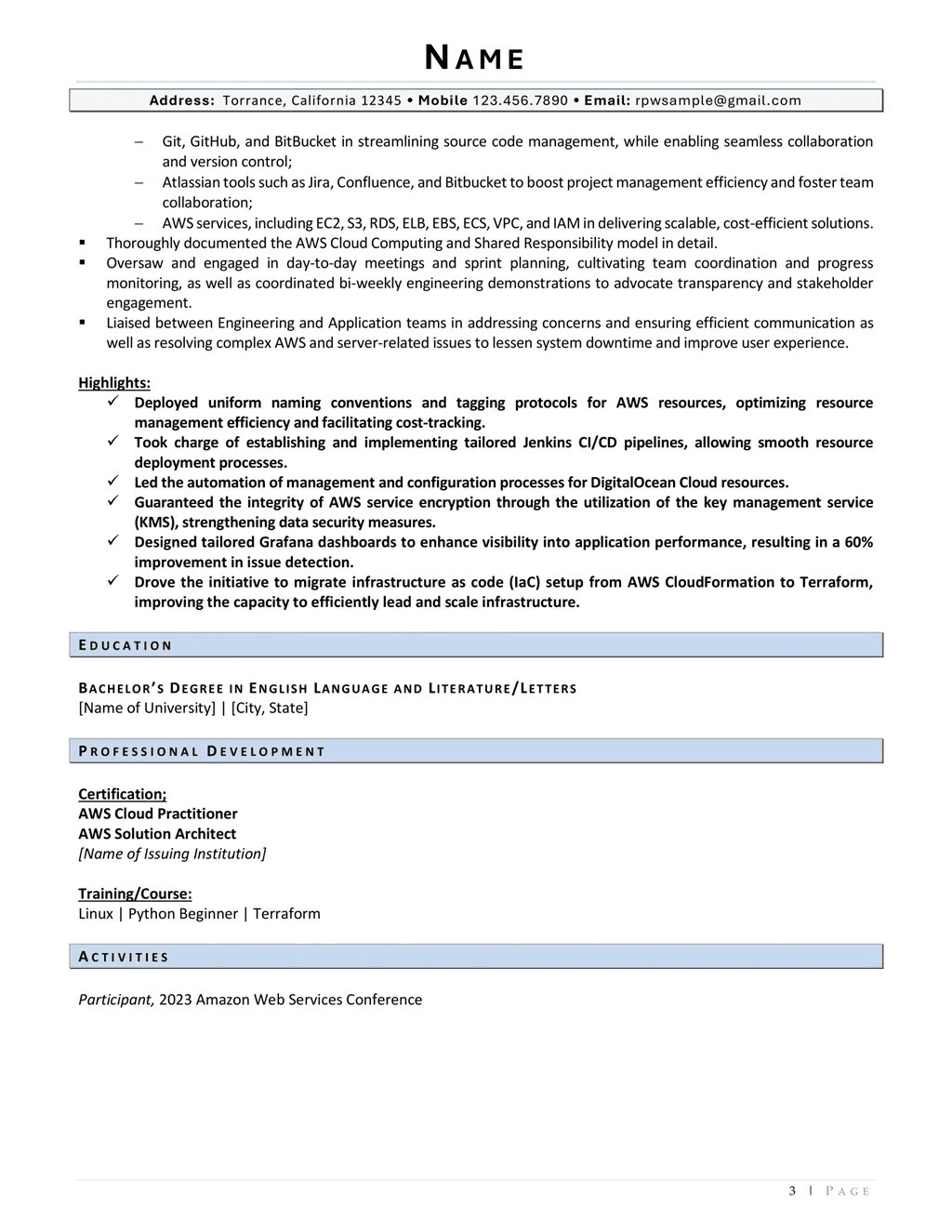
Feel free to download your own copy of this DevOps Engineer resume example.
Software Tester DevOps Engineer Resume
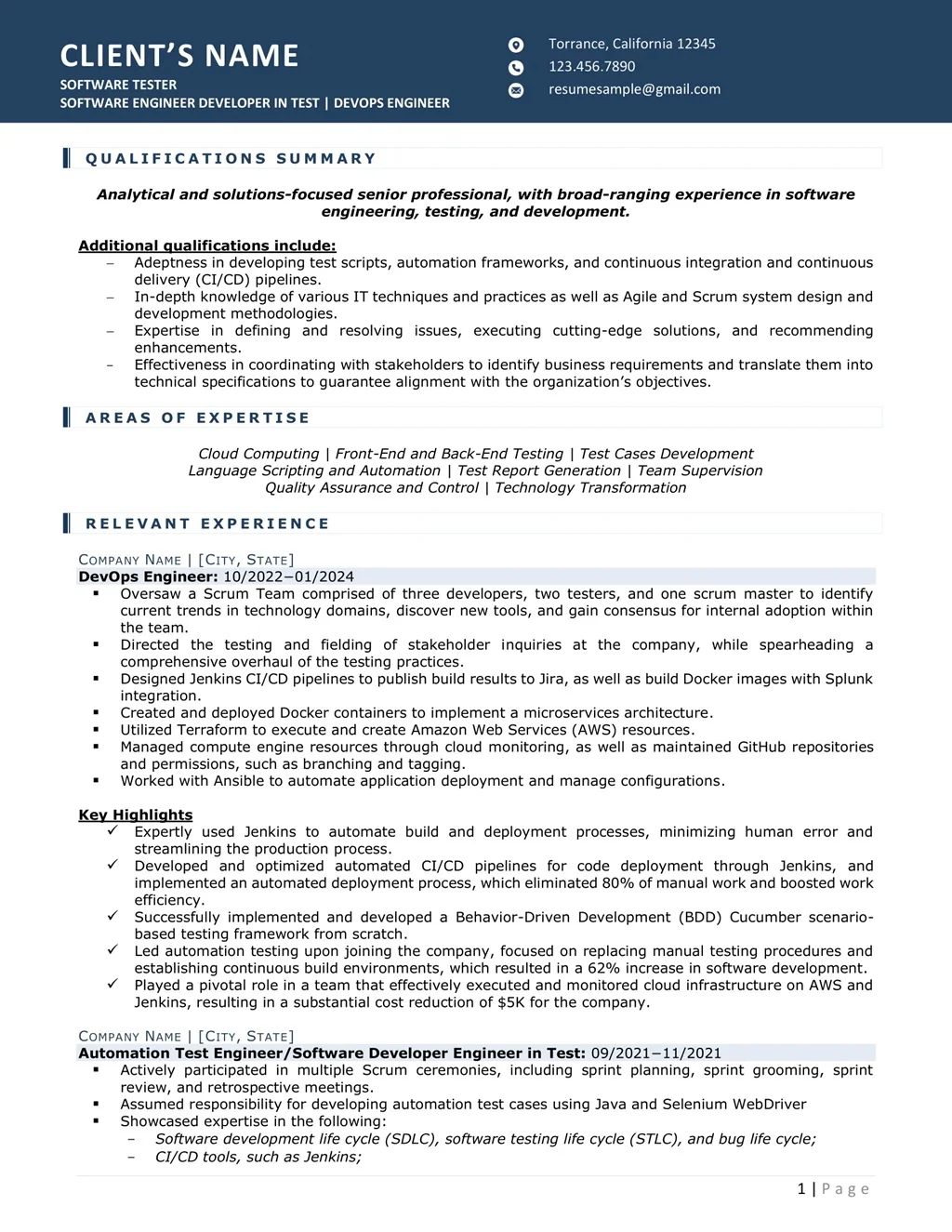
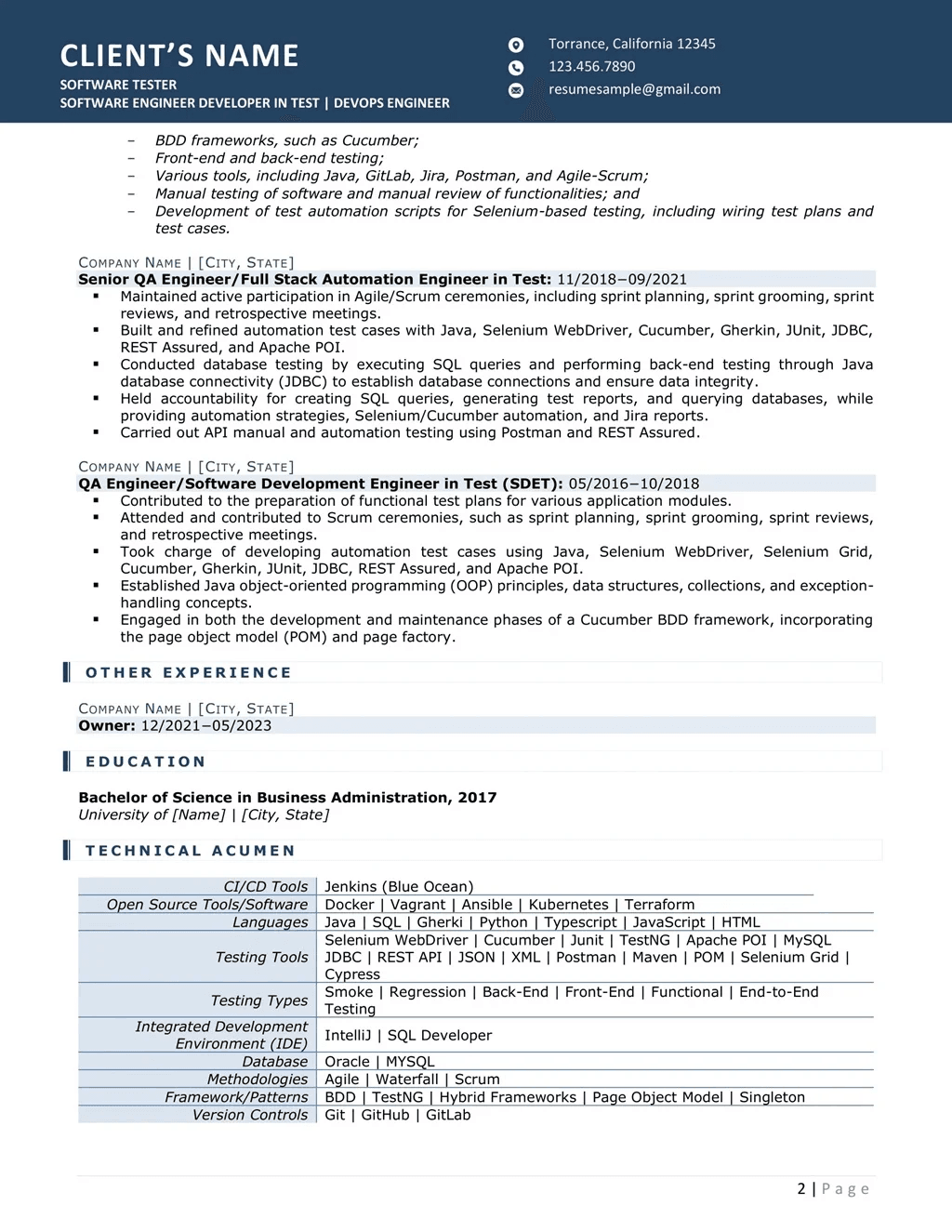
Feel free to download your own copy of this Software Tester DevOps Engineer resume example.
Key Skills for a DevOps Engineer Resume
When building a DevOps engineer resume, it’s important to highlight a blend of technical and interpersonal skills that demonstrate your ability to bridge development and operations effectively. Be sure to include relevant skills tailored to the DevOps role, as this helps showcase your qualifications to potential employers. Additionally, make sure to highlight DevOps skills that align with industry expectations to improve your chances of passing applicant tracking systems (ATS) and standing out in the hiring process.
Here are essential skills to include and tips on how to present them:
Technical Skills
- Continuous Integration and Continuous Deployment (CI/CD): Showcase your experience designing, implementing, and optimizing CI/CD pipelines using tools like Jenkins, GitLab CI, or CircleCI. Highlight your expertise in continuous delivery, emphasizing how you have automated deployment workflows, reduced manual deployment efforts, and improved overall system reliability by minimizing manual deployment efforts.
- Cloud Platforms: Highlight proficiency with cloud providers such as AWS, Azure, or Google Cloud Platform, and demonstrate your experience working in diverse cloud environments. Include relevant certifications like AWS Certified DevOps Engineer or Azure DevOps Engineer to validate your expertise. Reference your ability to leverage AWS services (e.g., Lambda, EC2, RDS, DynamoDB, CloudFormation) and cloud services in general.
- Containerization and Orchestration: Detail your experience with Docker and Kubernetes, emphasizing your ability to manage containerized applications and automate deployment workflows. Reference your knowledge of crafting a kubernetes DevOps engineer resume and highlight certifications such as certified Kubernetes administrator to demonstrate your expertise in container orchestration.
- Infrastructure as Code (IaC): Demonstrate knowledge of IaC tools like Terraform, Ansible, or CloudFormation, focusing on how you’ve automated infrastructure provisioning, infrastructure automation, and configuration management to improve scalability and reliability within cloud infrastructure. Highlight your ability to automate processes, reduce manual deployment efforts, and streamline manual deployment efforts, resulting in more efficient and predictable deployments.
- Configuration Management Tools: Include experience with tools such as Puppet, Chef, or SaltStack, highlighting how you’ve maintained consistent environments and reduced configuration drift.
- Version Control Systems: Emphasize your proficiency with Git or other version control tools, describing how you’ve managed code repositories and facilitated collaboration within software development teams.
- Monitoring and Logging: Mention your familiarity with monitoring tools like Prometheus, Grafana, ELK Stack, or Datadog, and how you’ve used them to enhance system reliability, quickly resolve issues, and implement robust alerting systems.
- Security Practices: Highlight your knowledge of integrating security into the DevOps lifecycle (DevSecOps), including automated vulnerability scanning and network security measures.
- Automation Tools: Demonstrate your proficiency with automation tools for security automation, vulnerability scanning, and compliance workflows, which are essential for streamlining DevOps processes and ensuring system security.
- Educational Background: Reference your educational background in software engineering or computer science, as these disciplines provide a strong foundation for technical expertise and career development in DevOps engineering.
- Specialized Resume Types: Mention your familiarity with crafting and optimizing specialized resumes such as lead DevOps engineer resume, senior DevOps engineer resume, DevOps manager resume, and DevOps architect resume, which highlight technical skills, leadership, and measurable achievements in the field of DevOps engineering.
Soft Skills
- Collaboration and Communication: Showcase your communication skills and your ability to work effectively with cross-functional teams, including development, QA, and operations, to streamline the software development process. For example, strong communication skills help facilitate collaboration by ensuring clear expectations and smooth information flow between team members.
- Problem-Solving: Illustrate your capacity to troubleshoot complex system issues and implement solutions that minimize downtime and improve performance.
- Adaptability: Demonstrate your willingness to learn new tools and technologies, keeping pace with evolving DevOps practices and cloud technologies.
- Time Management: Highlight your skill in prioritizing tasks and managing multiple projects simultaneously to meet tight deadlines in fast-paced environments.
- Attention to Detail: Emphasize your commitment to accuracy and thoroughness in configuration management and deployment processes to avoid costly errors.
- Leadership: Showcase your ability to mentor junior team members, lead initiatives, and foster a collaborative DevOps culture that drives continuous improvement and enhances team productivity through mentoring and best practices.

How to Present Your Skills Effectively?
Presenting your skills in a clear and impactful way is crucial to making your DevOps engineer resume stand out. Hiring managers want to see not just what skills you have, but how you have applied them to achieve tangible results. Demonstrating a proven track record of success in DevOps roles—such as optimizing deployment pipelines, reducing deployment times, and improving system uptime—can significantly strengthen your resume.
Here are key strategies to help you showcase your skills in a manner that highlights your value and aligns with the expectations of development and operations teams.
1. Use quantifiable achievements.
Illustrate the impact of your skills by including measurable results, such as “Automated infrastructure provisioning with Terraform, reducing setup time by 50%.” Quantifying your accomplishments helps hiring managers understand the tangible benefits you have delivered, making your contributions more compelling and credible.
2. Tailor skills to the job description.
Customize your skills section to align closely with the keywords and requirements specified in the job description. This targeted approach not only improves your chances of passing Applicant Tracking Systems (ATS) but also shows recruiters that you have the specific expertise they are seeking for their DevOps engineer role.
3. Integrate skills within work experience.
Rather than listing skills in isolation, demonstrate how you have applied them in real-world scenarios by weaving them into your work experience bullet points. For example, describe how you collaborated with a software development team to automate infrastructure deployment or improve system reliability as part of a DevOps initiative. Providing context around your skills through practical examples helps hiring managers see your hands-on proficiency and problem-solving abilities.
4. Highlight relevant certifications.
Certifications related to DevOps, cloud platforms, or container orchestration serve as strong proof of your technical knowledge and commitment to professional development. For example, earning the certified Kubernetes administrator certification demonstrates practical expertise in Kubernetes and is highly valued by employers. Including these credentials adds weight to your resume and can differentiate you from other candidates in a competitive job market.
5. Balance technical and soft skills.
While technical expertise is essential, your ability to work well with others is equally important in DevOps roles. Use brief examples to showcase your communication, collaboration, and leadership skills alongside your technical qualifications, demonstrating that you can effectively contribute within cross-functional teams and drive successful project outcomes. For example, highlight your experience working with a cross functional team to deliver DevOps solutions, such as implementing CI/CD pipelines or automating infrastructure across multiple departments.
Crafting an Effective DevOps Resume Summary
A well-crafted DevOps engineer resume summary is your chance to grab the attention of hiring managers right away. Instead of just listing your skills, use this space to share what makes you unique—your mix of technical know-how and real achievements.
Show how you can automate tasks, improve cloud systems, and keep software delivery smooth and fast. Don’t forget to highlight how well you work with different teams, especially collaborating with the operations team to ensure system reliability. DevOps engineers are key contributors to business outcomes by bridging development and operations. A strong summary helps you stand out by clearly showing the value you bring to the table.
Here are some examples to inspire you:
- Automated deployment workflows using Jenkins and Terraform, reducing release times by 40% and improving system reliability. Seeking to leverage cloud computing expertise to optimize infrastructure scalability.
- Orchestrated containerized application deployments with Kubernetes, achieving 99.99% uptime and a 30% reduction in infrastructure costs. Aiming to lead DevOps practices adoption in a dynamic engineering team.
- AWS Certified DevOps Engineer with experience in CI/CD pipeline optimization and infrastructure as code. Successfully cut deployment failures by 50% while driving cross-functional collaboration to enhance software delivery.
- Skilled in cloud platform expertise and configuration management tools, delivering automated deployment scripts that improved release frequency by 60%. Looking to contribute to innovative DevOps solutions in a forward-thinking organization.
- Senior DevOps Engineer with proven leadership in managing cross-functional teams and implementing automation tools to drive process improvements and system reliability.
- Expert in optimizing the deployment process, designing and automating deployment workflows to support robust CI/CD pipelines and ensure seamless infrastructure management.

Quantifying Achievements in DevOps Resumes
Adding numbers to your resume is a powerful way to show the real impact you’ve made. Hiring managers love seeing clear, measurable results because they tell a story of how you’ve improved things. When it comes to DevOps, focusing on improvements in deployment speed and system reliability can really make your resume shine. It’s also important to align your quantified achievements with DevOps job expectations, ensuring your resume matches the skills and results employers are seeking.
Think about including achievements like:
- Boosting deployment efficiency to get software out faster.
- Increasing system uptime so your applications run smoothly without interruptions.
- Speeding up deployment processes to save time and effort.
- Enhancing system reliability to reduce crashes and downtime.
- Automating processes to achieve measurable improvements in efficiency and reliability.
You can also highlight how you’ve optimized resources, such as:
- Cutting cloud costs by 30% through smart resource management.
- Making deployments 70% faster by automating key steps.
- Achieving higher deployment success rates to keep things running without hiccups.
- Saving time by automating processes and reducing manual work.
- Improving cloud resource use to get the most out of your infrastructure.
- Implementing strategies that cut down on unnecessary cloud spending.
Formatting Your DevOps Engineer Resume
Proper formatting is key to making your resume easy to read and helping it pass through (ATS). Here are six simple tips to make your resume stand out:
Keep it short but concise.
If you’re just starting out, stick to one page. If you have more experience, two pages are fine—but don’t go overboard. Hiring managers often skim resumes quickly, so you want to make sure your most important skills and achievements jump out right away. Focusing on quality over quantity keeps your resume sharp and effective.
Make it look clean and professional.
Choose easy-to-read fonts and keep them consistent throughout your resume. Use clear headings and leave enough space between sections so everything feels organized and not cluttered. A clean, professional layout not only looks good but also makes it easier for hiring managers to navigate your resume and find the information they need.
Use the right keywords.
Carefully read the job description and include the key skills and terms they mention. Applicant Tracking Systems scan for these keywords to decide if your resume moves forward. Using the right words shows you understand what the employer is looking for and increases your chances of getting noticed.
Organize your info well.
Break your resume into clear sections like summary, skills, work experience, and education. Make sure your contact information and job title or career objective are easy to find at the top. When your resume is well-structured, hiring managers can quickly get a sense of who you are and what you bring to the table.
Save your resume as a PDF.
This keeps your formatting intact no matter what device or program someone uses to open it. You don’t want your carefully designed resume to look messy or misaligned because of file compatibility issues. PDFs ensure your resume appears polished and professional every time.
Make it easy to scan.
Use bullet points and short sentences to highlight your achievements and skills. Avoid large blocks of text that can overwhelm the reader. When your resume is easy to skim, hiring managers can quickly spot your qualifications and see why you’re the right person for the job.
Common Mistakes to Avoid in DevOps Resumes
When crafting your DevOps resume, it’s important to avoid pitfalls that can diminish your chances of landing an interview. Beyond showcasing your skills and achievements, steering clear of common errors ensures your resume presents you as a polished and professional candidate. Here are frequent mistakes to watch out for that can undermine the effectiveness of your resume:
- Including generic or cliché phrases that fail to demonstrate unique value.
- Listing responsibilities instead of focusing on achievements and results.
- Overloading the resume with excessive technical jargon that may confuse non-technical hiring managers.
- Using inconsistent formatting that distracts from the content.
- Neglecting to proofread, resulting in spelling or grammatical errors.
- Omitting a clear and concise resume summary or objective.
- Failing to highlight relevant certifications or professional development.
- Ignoring the importance of showcasing leadership or teamwork experiences.
- Providing incomplete or outdated contact information.
- Submitting resumes that exceed the recommended length, causing key information to be overlooked.

Secure Your Dream DevOps Engineer Role with a Standout Resume That Gets You Noticed
Crafting a compelling DevOps engineer resume can be challenging, especially when you need to showcase a unique blend of technical expertise, collaboration skills, and measurable achievements. If you find yourself struggling to write your own DevOps resume that truly captures your value and stands out to hiring managers, professional resume writing services can be a game-changer.
Recognizing these challenges, Resume Professional Writers offers expert resume assistance for DevOps professionals. We understand the fast-paced, technical nature of DevOps roles and the importance of a resume that reflects your capabilities accurately and impressively. Our team of seasoned writers works closely with you to craft a tailored DevOps engineer resume that emphasizes your technical skills, certifications, and achievements while showcasing your ability to bridge development and operations teams effectively.
Take the first step towards your dream DevOps role by getting your custom resume today and unlock new opportunities in this dynamic field.








